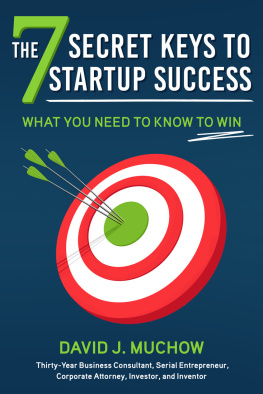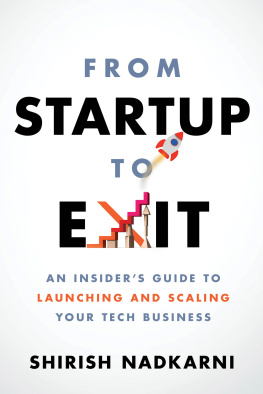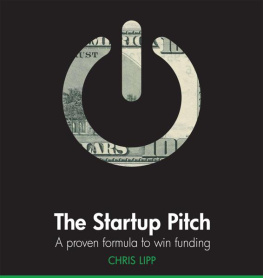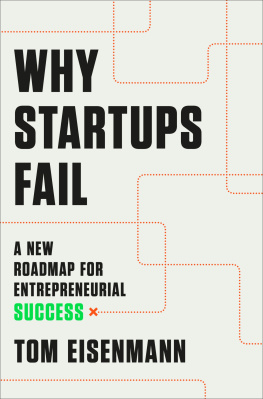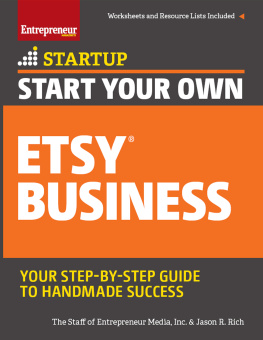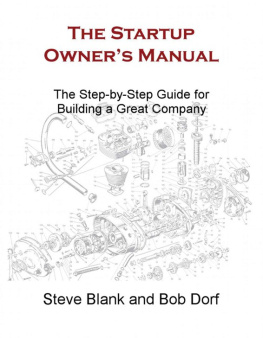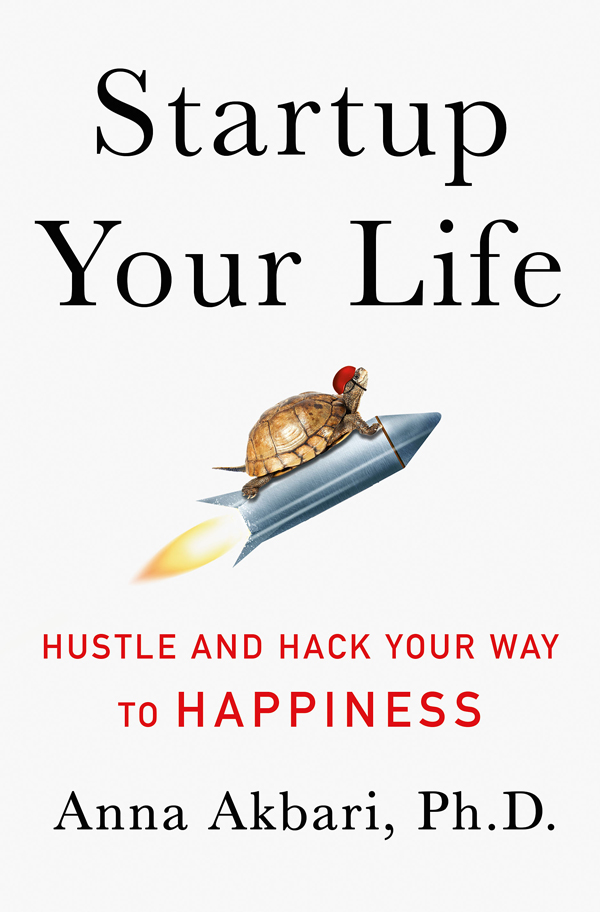Contents
Guide

The author and publisher have provided this e-book to you for your personal use only. You may not make this e-book publicly available in any way. Copyright infringement is against the law. If you believe the copy of this e-book you are reading infringes on the authors copyright, please notify the publisher at: us.macmillanusa.com/piracy.
Happiness is not a goal, it is a by-product.
E LEANOR R OOSEVELT , You Learn By Living
A book is a startup unto itself: it begins as a mental spark, evolves significantly (though not always smoothly) over time, and requires the contributions of an entire team to make it a reality. I have been fortunate to have a crew of incredible partners in this endeavor. My agent, Kirsten Neuhaus, of Foundry Literary + Media, is the primary reason this book came to fruitionwords fall short of adequately expressing my gratitude for her vision, indefatigable efforts, and unwavering confidence in me.
Im equally grateful for the clarity and precision of my skilled editor at St. Martins Press, Emily Carleton, whose enthusiasm and belief in this project made it possiblethank you for championing it and me.
My innovation partner and collaborator, Dan Gonzalez, served as a crucial sounding board throughout this journey. His creativity, curiosity, and unflappable temperament make work feel like play every day. John Floods thoughtful research assistance far exceeded my expectations; thank you for committing wholeheartedly and patiently diving so deeply into these topics and stories with me.
And finally, I am grateful to my mother, Jean Neibauer: Your parenting philosophy of open the door and get out of the way continues to serve me. Thank you for giving me the space to experiment and fail, even without a safety net.
Sometime in my twenties, I developed a fear of flying. Not a debilitating, cant-get-on-the-plane kind of fear, but a high level of anxiety in anticipation of the flightwhich was further exacerbated when the first bump of turbulence inevitably hit. My mind would race, my body would freeze, and I would prepare myself for the worst. As a kid, the thought that a flight would be anything other than successful never entered my mind. But as firsthand experience and a steady stream of horrifying one-off news stories accumulated in my brain, I came to associate flyingconsciously or otherwisewith a loss of personal control.
Control, that elusive thing. Like many high-functioning individuals, I thrive when Im calling the shots. But in the air, the usual systems are completely unavailable to menot least, any chance of escape. Its distressing at best, completely paralyzing at worst.
You might say that the years between college graduation and the point at which we eventually pair off and start a family resemble that dreaded bout of turbulence. The pressure of establishing sustainable employment, passable financial security, and a stable romantic relationship is enough to make even the most mature, collected person hit the panic button.
I was no exception. I finished my PhD in the spring of 2008. Too burnt out to make any rational decisions about what would come next, I decided to use that summer to decompress and recalibrate. I slept regularly for the first time in years. I taught a summer school course and took on some part-time consulting projects, but for the first time in my life, I also zoned out. It felt amazing.
Soon, fall arrived, andsince I only knew how to think and operate in semestersI decided it was time to get serious about sorting out the next phase of my lifehopefully making something of the expensive, arduous preparation Id invested in for so long.
Of course, my timing was terrible. One glance at a newspaper or television that year confirmed that the financial system was collapsing. And even as I saw it affect various bankers and hedge fund moguls I knew, I considered myself exempt from the fallout. Im in academia, I told myself. How in the world could Wall Street affect me? A nave proclamation, indeed, about a series of events that would leave virtually no industry and few individuals untouched.
So there I was, an eager, optimistic woman with an advanced degree and a mountain of debt, ready to tackle the worldbut no one was biting. Academia shifted to a mostly adjunct model, so unless I was willing to move back to Iowa or some equally remote location, finding a tenure-track position would be next to impossible. And the corporate world was no more hospitable. In fact, I quickly found that I had more friends who were unemployed than employed. At least most of them received severance pay and had a bit of savings to cushion their job search. I, on the other hand, was still living like a twenty-two-year-old grad student. The panic button was permanently clenched.
This was the first time in my life that I felt a total lack of control. The world as I knew it was crumbling around me, and I couldnt change it any more than the choices Id made so farnor did I want to. Instead, my best recourse was to embrace the situation.
At the time, the spirit of entrepreneurship hadnt yet taken hold in our culture. It wasnt until after 2008 that a confluence of technological advancements and financial circumstances, as well as a shift in how work gets done and how money gets raised, settled into our everyday culture, eventually producing a society of what Silicon Valley calls everywhere entrepreneurship. And yet, even before it became our default work mode and mindset, I had some entrepreneurial ideas I needed to explore. I became an early adopter: In 2002, right after college and while still in the Peace Corps, I ventured out on my own to start a music foundation. I spearheaded the venture, raised all the international financing, and managed the program during grad school for five years, at which time it was permanently integrated into the local community and supported by government funds (no small feat in an underserved area of the Dominican Republic). Building on that theme and momentum, back in the States in 2004, I collaborated with a classmate while still in grad school to start an arts education platform that matched students of all ages with talented creative professionals in New York City for private lessons.
That company eventually fizzled, but Id been bitten by the bug. Soon, even my casual social conversations shifted to verbal daydreaming about potential companies and projects. Wouldnt it be cool if there were a , followed by rapid-fire brainstorming, popped up in more and more exchanges. I knew I couldnt control the rest of the world, but perhaps I could find my own satisfaction in life as an entrepreneur.
This approach challenged and stimulated me in much the same way school always had. Unlike many entrepreneurs, I loved school. Some find academic institutions limitingbut I found them liberating. School was the only place Id known where an uninhibited exploration of ideas was central to its operation. Where creative imaginings and conversations about idealized possibilitiesnot just realitieshappen daily. It felt like play, not work, and if I could find a way to replicate and sustain that feeling, I could never work again.
While I further nurtured my entrepreneurial persona, I continued to develop and teach sociology courses that deepened my understanding of the world onto which I wanted to project my ideas. I taught courses that explored our sense of identityeverything from the way we look to our relationships with technology. I did research on how we form social connections and what helps or hinders our quest for happiness. I was thrivingintellectually. The rest of my life, however, left much to be desired.


